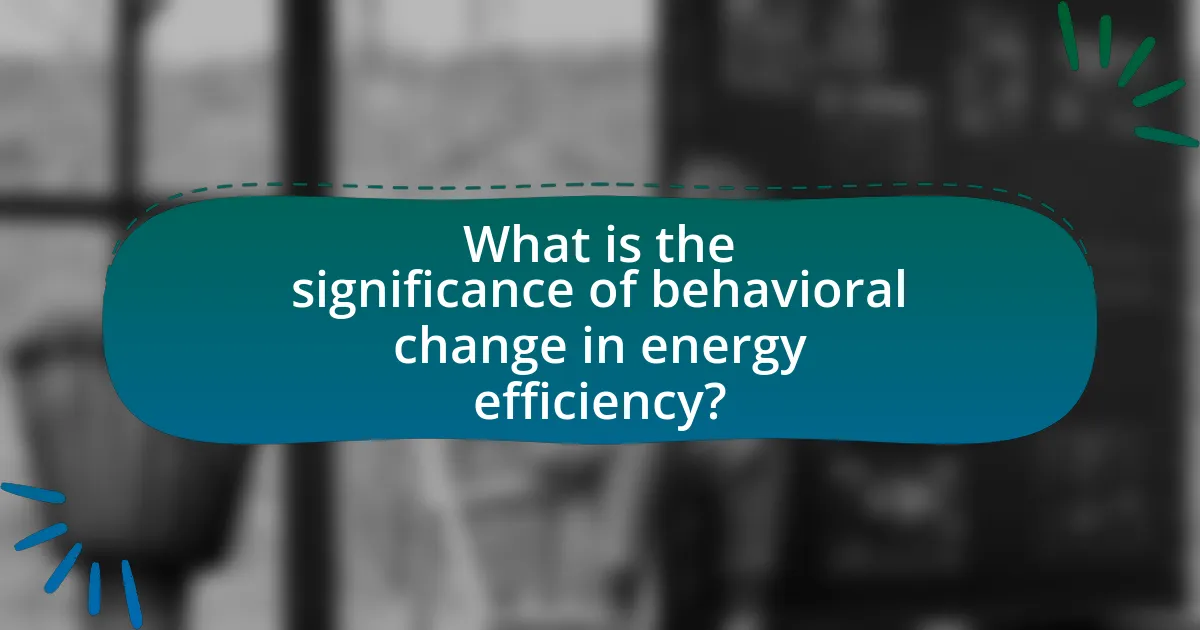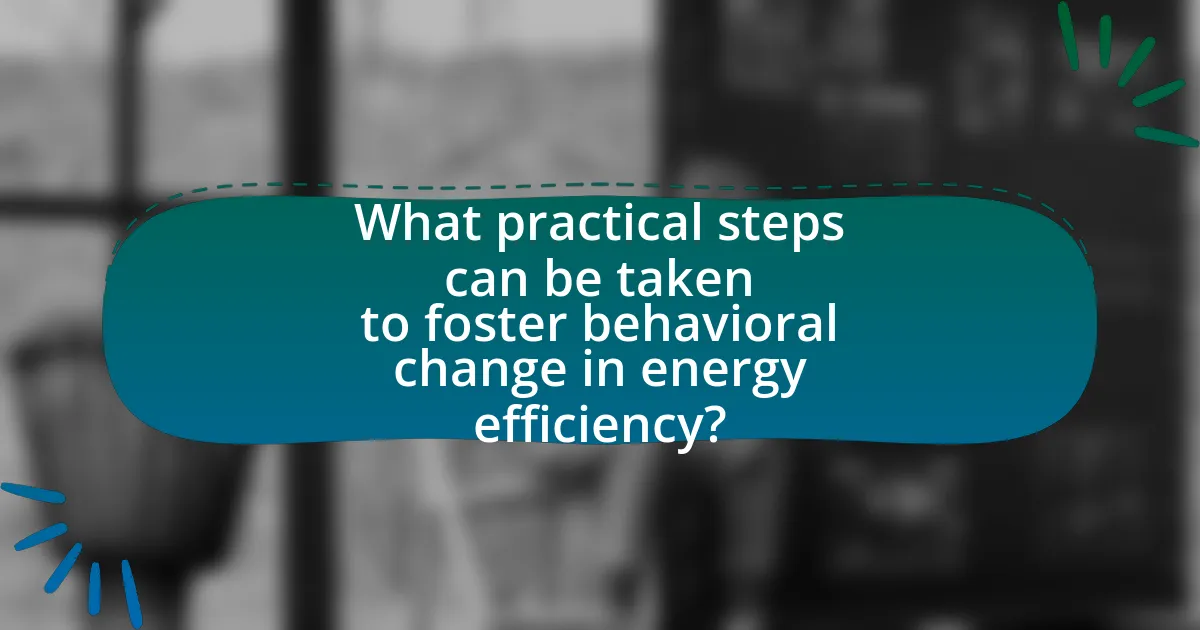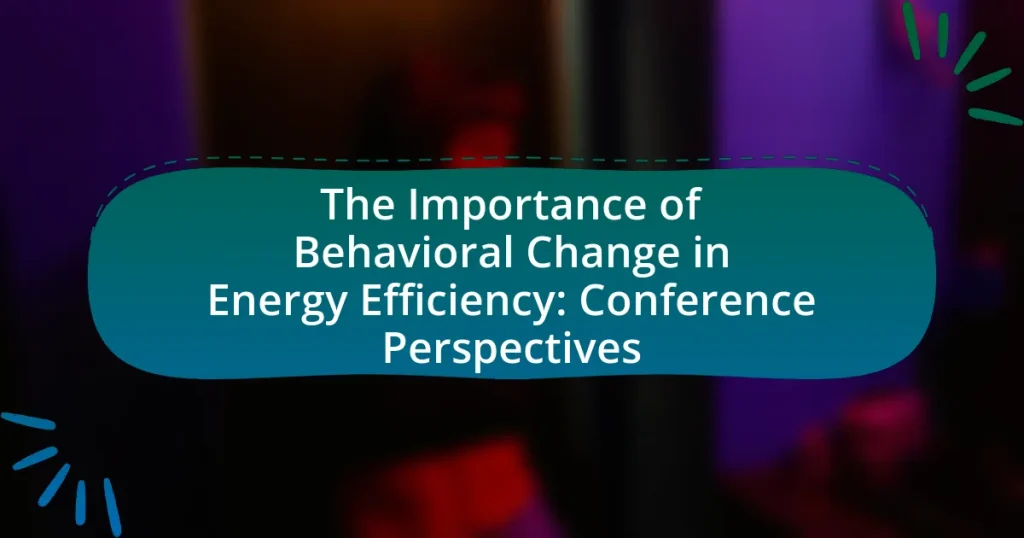The article focuses on the significance of behavioral change in enhancing energy efficiency, emphasizing how individual and collective actions can lead to substantial reductions in energy consumption and greenhouse gas emissions. It explores the psychological factors influencing energy-related behaviors, the impact of social norms, and the role of education in promoting energy-saving practices. Additionally, it discusses the challenges faced in implementing behavioral change, strategies for fostering such changes, and insights from recent conferences that highlight effective approaches and collaborative efforts among stakeholders. The article underscores the importance of understanding and addressing behavioral dynamics to achieve successful energy efficiency initiatives.

What is the significance of behavioral change in energy efficiency?
Behavioral change is significant in energy efficiency because it directly influences energy consumption patterns and resource utilization. When individuals adopt energy-saving behaviors, such as turning off lights when not in use or using energy-efficient appliances, they contribute to reduced energy demand and lower greenhouse gas emissions. Research indicates that behavioral interventions can lead to energy savings of 5% to 15% in residential settings, demonstrating the tangible impact of changing habits on energy efficiency. This shift not only enhances sustainability but also promotes economic benefits through reduced energy costs for consumers and decreased strain on energy systems.
How does behavioral change impact energy consumption patterns?
Behavioral change significantly impacts energy consumption patterns by altering individual and collective energy use habits. For instance, when individuals adopt energy-efficient practices, such as turning off lights when not in use or using public transportation, overall energy demand decreases. Research conducted by the American Council for an Energy-Efficient Economy indicates that behavioral interventions can lead to energy savings of 5% to 15% in residential settings. This demonstrates that modifying behaviors directly correlates with reduced energy consumption, highlighting the critical role of behavioral change in enhancing energy efficiency.
What psychological factors influence energy-related behaviors?
Psychological factors that influence energy-related behaviors include attitudes, social norms, perceived behavioral control, and motivation. Attitudes shape how individuals perceive energy use, where positive attitudes towards energy conservation can lead to more sustainable behaviors. Social norms, or the behaviors and expectations of others, significantly impact individual choices; for instance, if energy-saving practices are common in a community, individuals are more likely to adopt similar behaviors. Perceived behavioral control refers to an individual’s belief in their ability to perform energy-saving actions, which can enhance or hinder their engagement in such behaviors. Lastly, intrinsic and extrinsic motivations, such as personal values or financial incentives, drive individuals to change their energy consumption habits. Research has shown that these psychological factors are critical in determining energy-related behaviors, as evidenced by studies indicating that interventions targeting these factors can lead to significant reductions in energy use.
How do social norms affect individual energy use?
Social norms significantly influence individual energy use by shaping behaviors and expectations regarding energy consumption. For instance, when communities prioritize energy conservation, individuals are more likely to adopt energy-efficient practices, such as reducing electricity usage or utilizing public transportation. Research conducted by the American Psychological Association indicates that social norms can lead to a 10-20% reduction in energy consumption when individuals perceive that their peers are engaging in energy-saving behaviors. This demonstrates that the collective behavior of a community can create a powerful incentive for individuals to modify their energy use in alignment with those norms.
Why is understanding behavioral change crucial for energy efficiency initiatives?
Understanding behavioral change is crucial for energy efficiency initiatives because it directly influences how individuals and organizations adopt and maintain energy-saving practices. Research indicates that approximately 20-30% of energy savings can be attributed to behavioral changes, highlighting the significant impact of human actions on energy consumption. By comprehending the motivations, barriers, and triggers that drive behavior, energy efficiency programs can be tailored to effectively encourage sustainable practices, leading to more successful outcomes and reduced energy waste.
What role does education play in promoting energy-efficient behaviors?
Education plays a crucial role in promoting energy-efficient behaviors by increasing awareness and understanding of energy consumption and its environmental impacts. Through structured learning, individuals gain knowledge about energy-saving practices, such as using energy-efficient appliances and adopting sustainable habits. Research indicates that educational programs can lead to a significant reduction in energy use; for instance, a study by the American Council for an Energy-Efficient Economy found that households participating in energy education initiatives reduced their energy consumption by an average of 10-15%. This demonstrates that informed individuals are more likely to implement energy-efficient behaviors, thereby contributing to overall energy conservation efforts.
How can behavioral change strategies enhance energy efficiency programs?
Behavioral change strategies can enhance energy efficiency programs by actively influencing individuals’ energy consumption habits, leading to reduced energy use and increased program effectiveness. For instance, programs that incorporate social norms, feedback mechanisms, and incentives have been shown to significantly lower energy consumption. A study by the American Council for an Energy-Efficient Economy found that feedback on energy usage can reduce consumption by up to 15%. Additionally, initiatives that promote community engagement and peer influence can further motivate individuals to adopt energy-saving behaviors, thereby amplifying the overall impact of energy efficiency programs.
What are the challenges in implementing behavioral change for energy efficiency?
The challenges in implementing behavioral change for energy efficiency include resistance to change, lack of awareness, and insufficient incentives. Resistance to change often stems from established habits and routines that individuals find difficult to alter. A study by the American Council for an Energy-Efficient Economy indicates that behavioral inertia can significantly hinder the adoption of energy-efficient practices. Lack of awareness about the benefits of energy efficiency and the available technologies also poses a challenge, as many individuals are not informed about how their actions impact energy consumption. Furthermore, insufficient financial and non-financial incentives can fail to motivate individuals to change their behavior, as highlighted in research by the International Energy Agency, which shows that effective incentive structures are crucial for promoting energy-efficient behaviors.
What barriers do individuals face in adopting energy-efficient practices?
Individuals face several barriers in adopting energy-efficient practices, including financial constraints, lack of awareness, and perceived inconvenience. Financial constraints often deter individuals from investing in energy-efficient technologies, as initial costs can be high despite long-term savings. A lack of awareness about the benefits and availability of energy-efficient options leads to underutilization of these practices. Additionally, individuals may perceive energy-efficient practices as inconvenient or requiring significant lifestyle changes, which can further hinder adoption. Research indicates that these barriers significantly impact the overall effectiveness of energy efficiency initiatives, as highlighted in studies conducted by the American Council for an Energy-Efficient Economy, which found that financial incentives and educational programs can effectively mitigate these challenges.
How can policymakers address these challenges effectively?
Policymakers can address challenges in energy efficiency by implementing targeted behavioral change initiatives. These initiatives can include educational campaigns that raise awareness about energy conservation, financial incentives for adopting energy-efficient technologies, and regulations that promote sustainable practices. For instance, studies show that programs like the Energy Star initiative have successfully increased energy-efficient appliance sales by 25% through consumer education and incentives. By focusing on behavioral change, policymakers can effectively reduce energy consumption and promote sustainable practices within communities.

What insights have emerged from recent conferences on this topic?
Recent conferences on the importance of behavioral change in energy efficiency have highlighted the critical role of consumer engagement in achieving energy-saving goals. Insights from these events indicate that effective communication strategies and tailored interventions significantly enhance energy-efficient behaviors among individuals and organizations. For example, studies presented at the conferences revealed that personalized feedback on energy consumption can lead to a 10-15% reduction in energy use, demonstrating the impact of behavioral nudges. Additionally, discussions emphasized the necessity of integrating behavioral science into energy policy frameworks to foster sustainable practices, as evidenced by successful case studies from various regions that implemented such strategies.
What key themes were discussed regarding behavioral change and energy efficiency?
Key themes discussed regarding behavioral change and energy efficiency include the role of social norms, the impact of incentives, and the importance of education and awareness. Social norms influence individual behaviors by creating a sense of accountability and community engagement, which can lead to increased energy-saving practices. Incentives, such as financial rewards or rebates, motivate individuals to adopt energy-efficient technologies and practices. Education and awareness initiatives are crucial for informing the public about energy consumption and the benefits of efficiency, leading to more sustainable behaviors. These themes are supported by research indicating that behavioral interventions can significantly reduce energy usage in residential and commercial settings.
How have experts defined the relationship between behavior and energy use?
Experts define the relationship between behavior and energy use as a critical factor influencing energy consumption patterns. Research indicates that individual and collective behaviors significantly impact energy efficiency, with studies showing that behavioral changes can lead to substantial reductions in energy use, such as a 10-30% decrease in residential energy consumption when individuals adopt energy-saving practices. This relationship is supported by findings from the International Energy Agency, which emphasizes that understanding and modifying consumer behavior is essential for achieving energy efficiency goals.
What innovative approaches were presented at these conferences?
Innovative approaches presented at the conferences focused on integrating behavioral science with energy efficiency initiatives. These approaches included the use of gamification to engage consumers in energy-saving practices, as well as personalized feedback mechanisms that leverage real-time data to influence user behavior. For instance, studies highlighted how social comparison tools can motivate individuals to reduce energy consumption by showing them how their usage compares to that of their peers. Additionally, workshops emphasized the role of community-based programs that foster collective action towards energy efficiency, demonstrating that collaborative efforts can lead to significant reductions in energy use.
How do conference perspectives shape future energy efficiency strategies?
Conference perspectives shape future energy efficiency strategies by providing a platform for stakeholders to share insights, research findings, and best practices that influence policy and implementation. These gatherings facilitate collaboration among industry leaders, researchers, and policymakers, leading to the identification of effective behavioral change strategies that can be adopted on a larger scale. For instance, the International Energy Agency’s 2021 report highlighted how discussions at conferences led to the adoption of innovative energy-saving technologies and practices, demonstrating the tangible impact of shared knowledge on energy efficiency initiatives.
What collaborative efforts were highlighted among stakeholders?
Collaborative efforts among stakeholders included partnerships between government agencies, private sector companies, and non-profit organizations to promote energy efficiency initiatives. These collaborations aimed to share resources, knowledge, and best practices, enhancing the overall impact of behavioral change strategies in energy consumption. For instance, joint programs were established to educate consumers on energy-saving practices, demonstrating a unified approach to addressing energy efficiency challenges.
How can conference findings influence public policy on energy efficiency?
Conference findings can significantly influence public policy on energy efficiency by providing evidence-based recommendations and showcasing successful case studies. These findings often highlight innovative practices and technologies that can be adopted at a larger scale, thereby informing policymakers about effective strategies for improving energy efficiency. For instance, the International Energy Agency reported that countries implementing policies based on conference insights have seen energy savings of up to 30%. By presenting data and expert opinions, conferences can shape the legislative agenda, leading to the development of regulations and incentives that promote energy-efficient behaviors among consumers and businesses.

What practical steps can be taken to foster behavioral change in energy efficiency?
To foster behavioral change in energy efficiency, organizations can implement targeted education and awareness campaigns. These campaigns should focus on providing clear information about energy-saving practices and their benefits, such as reduced utility bills and environmental impact. Research indicates that individuals are more likely to change their behavior when they understand the direct consequences of their actions; for instance, a study by the American Council for an Energy-Efficient Economy found that households that received personalized energy reports reduced their energy consumption by an average of 2% to 5%. Additionally, incorporating incentives, such as rebates for energy-efficient appliances or recognition programs for energy-saving behaviors, can motivate individuals to adopt more sustainable practices.
What strategies can individuals adopt to improve their energy efficiency?
Individuals can adopt several strategies to improve their energy efficiency, including using energy-efficient appliances, implementing smart home technology, and practicing energy-saving habits. Energy-efficient appliances, such as those rated by ENERGY STAR, consume less electricity, which can lead to significant savings; for example, replacing an old refrigerator with an ENERGY STAR model can save about $200 over its lifetime. Smart home technology, like programmable thermostats, allows individuals to optimize heating and cooling schedules, potentially reducing energy use by up to 10-30%. Additionally, simple habits such as turning off lights when not in use, unplugging devices, and using natural light can further enhance energy efficiency. Collectively, these strategies not only lower energy bills but also contribute to environmental sustainability by reducing overall energy consumption.
How can technology facilitate behavioral change in energy consumption?
Technology can facilitate behavioral change in energy consumption by providing real-time data and feedback to users, enabling informed decision-making. Smart meters and energy management systems allow consumers to monitor their energy usage patterns, which can lead to increased awareness and motivation to reduce consumption. For instance, a study by the American Council for an Energy-Efficient Economy found that households using smart meters reduced their energy usage by an average of 10-15%. Additionally, mobile applications that gamify energy-saving practices encourage competition and community engagement, further promoting sustainable behaviors. These technological tools create a direct link between user actions and energy consumption, effectively driving behavioral change.
What role do community programs play in promoting energy-efficient behaviors?
Community programs play a crucial role in promoting energy-efficient behaviors by fostering awareness and providing resources for sustainable practices. These programs often engage local residents through workshops, informational campaigns, and incentives, which help to educate individuals about the benefits of energy efficiency. For instance, a study by the American Council for an Energy-Efficient Economy found that community-based initiatives can lead to a 10-20% reduction in energy consumption among participants. By creating a supportive environment and encouraging collective action, community programs effectively motivate individuals to adopt energy-saving habits, ultimately contributing to broader environmental goals.
What best practices can organizations implement to encourage energy-efficient behaviors?
Organizations can implement several best practices to encourage energy-efficient behaviors, including establishing clear energy-saving goals, providing training and resources, and incentivizing energy-efficient practices. Setting specific, measurable targets for energy reduction helps employees understand the organization’s commitment to efficiency. Training programs can educate staff on energy-saving techniques, while resources such as energy audits and efficiency toolkits can empower employees to take action. Additionally, offering incentives, such as recognition programs or financial rewards for energy-saving initiatives, can motivate individuals to adopt and maintain energy-efficient behaviors. Research indicates that organizations that actively engage employees in energy efficiency initiatives see a significant increase in participation and overall energy savings.
How can organizations measure the effectiveness of their behavioral change initiatives?
Organizations can measure the effectiveness of their behavioral change initiatives through a combination of quantitative and qualitative metrics. Quantitative metrics include pre- and post-initiative surveys to assess changes in knowledge, attitudes, and behaviors, as well as tracking energy consumption data to evaluate actual reductions in usage. Qualitative metrics involve focus groups and interviews to gather insights on participant experiences and perceived impacts of the initiatives. Research indicates that organizations that utilize both types of metrics can achieve a more comprehensive understanding of their initiatives’ effectiveness, as evidenced by a study published in the Journal of Environmental Psychology, which found that combining quantitative data with qualitative feedback led to a 30% increase in reported behavioral changes among participants.
What resources are available for organizations seeking to enhance energy efficiency?
Organizations seeking to enhance energy efficiency can access a variety of resources, including government programs, industry guidelines, and educational materials. Government initiatives, such as the U.S. Department of Energy’s Energy Efficiency and Conservation Block Grant Program, provide funding and support for energy-saving projects. Industry guidelines, like those from the American Society of Heating, Refrigerating and Air-Conditioning Engineers, offer best practices for energy management. Additionally, educational resources, including workshops and online courses from organizations like the Association of Energy Engineers, equip organizations with knowledge and strategies to implement energy-efficient practices effectively.


